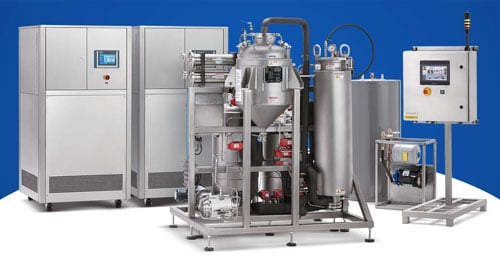In the world of cannabis extraction, light hydrocarbon extraction is the gold standard for producing everything from cannabinoid distillates to full-spectrum concentrates featuring a range of therapeutic cannabinoids, terpenes, flavonoids, and other compounds. Butane and propane, in particular, are the go-to solvents used to separate cannabis resin from the rest of the plant matter.
Light Hydrocarbon Extraction
Butane and propane are uniquely effective and safe solvents to use under the right circumstances. Using approved, closed-loop extraction equipment in a professional extraction facility with the proper ventilation and gas detection systems, extractors can get more out of the cannabis plant with hydrocarbons than any other solvents, but working with butane and propane takes skill, practice, and experimentation.
Hydrocarbon extraction is already a common practice in food manufacturing and is approved by the U.S. Food and Drug Administration for certain types of manufacturing. For example, the hexane solvent is approved for the extraction of vegetable oil from canola, safflower, soybeans, corn, and more items. Hexane can also be used to extract fish protein and other flavorful extracts.
Butane hash oil (BHO) extraction requires the highest quality materials, especially considering BHO products such as shatter, wax, live resin, and terp sauce, are consumed via inhalation. Butane and propane with impurities can produce a harsh-tasting and potentially toxic product, so commercial extraction businesses use instrument-grade butane for maximum purity.
What Kind Of Propane/Butane Should I Use?
Butane quality and type are crucial aspects to completing a safe extraction and producing a solvent-free and flavorful concentrate. Conventional butane fuel, also known as isobutane, contains a toxic chemical called methyl mercaptan. Methyl mercaptan is a colorless and flammable gas that carries a unique odor resembling rotten eggs or cabbage and used to detect leaks.
While methyl mercaptan is essential to let users know when there is a gas leak, working with low-quality butane or propane can be detrimental to the body in larger dosages. Commercial extraction companies use instrument-grade butane and propane that DO NOT contain methyl mercaptan.
Extraction experts recommend using highly refined butane, also known as n-butane, reaching 99.5 purity or above. This research and instrument-grade butane should also come with a certificate of analysis (COA) to ensure there are no impurities. A COA shows the amount (in parts per million or ppm) of gases in the solvent blend.
Extraction technicians will, sometimes, use a blend of butane and propane, usually a 70 percent butane and 30 percent propane blend for shatter or budder extractions. Hydrocarbon blends are capable of extracting more terpenes, due to propane’s lower boiling point, and produce a lighter hue in the final product. Some manufacturers may use propane only to extract the most amount of terpenes in a concentrate.
How To Clean Butane For BHO?
Using low-quality solvents will produce low-quality concentrates. Even the most advanced techniques may still not completely remove all contaminants through distillation or filtration. Furthermore, proper equipment cleaning must be performed to avoid the contaminants leeching onto the cannabis concentrate.
Some extractors choose to distill propane or butane before running it with cannabis for extraction. Extractors distill the solvent before doing a few clean runs before the extraction process to help remove the impurities from the gas, making for a better starting point.
What Is Mystery Oil?
Mystery oil is a leftover residue from the gas that has left many extraction artists scratching their heads about what’s in it. Open-blasting butane without the assistance of a closed-loop system leaves even more of the mystery oil in the final product. The “mystery oil,” as it’s appropriately called by extraction technicians, carries a distinct rubbery and tire-like smell.
Extraction companies who’ve done some experimentation and research predict the mystery oil is a combination of compounds including longer chain oleaginous waxes and trace amounts of sulfur. Web sleuths also suggest that the mystery oil consists of a lubricant found in low-quality butane canisters as a possible culprit, however no scientific studies have shown either hypothesis to be correct.
Many cheap cans of butane contain oils used as propelling agents or to lubricate machinery to fill cans, as well as protect the inside from rust and prevent clogging. Consumers may find the mystery oil ingredients listed as “one percent other.” These ingredients do not have to be listed. Closed-loop extraction equipment can be used to purify butane and propane to remove the mystery oil.
As cannabis oil extraction has become more popular, commercial extraction facilities are able to source higher grade butane and propane and the old fears of “mystery oil” are beginning to fade into the past.
Vacuum Purging BHO
A vacuum purge is the critical final phase for producing a clean-tasting and pure BHO concentrate after extraction. Vacuum ovens boil away any residual solvents from the cannabis resin. Under sub-atmospheric pressure, extractors can use low temperatures to evaporate the solvent. Using low temperatures also avoids boiling off any aromatic terpene compounds.
Vacuum purging can take multiple days to complete, but the final result is a pure and potent BHO concentrate without any impurities or residual solvent. In closed-loop BHO extraction systems, the butane converts to gas and recaptured and recirculated for further use. Butane is stored in its liquid state for future extractions.Light hydrocarbons are one of the most effective solvent types used to produce a wide range of connoisseur-grade concentrates. Utilizing hydrocarbon extraction equipment, however, requires computer controlled automated equipment (or skilled operators) and high-quality cannabis. Luna Technologies provides cannabis businesses with an automated extraction system capable of handling a large volume of concentrates.
.jpg)


